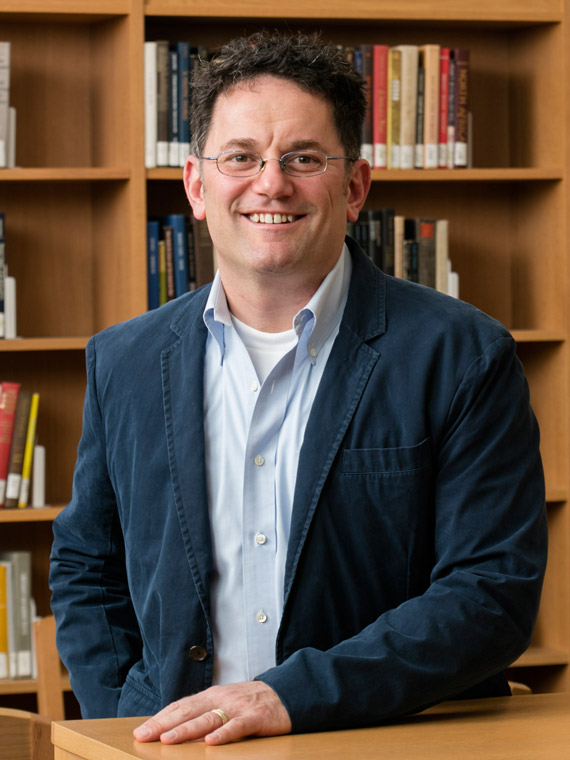BA, Drew University. Executive director of The Investigative Journalism and Justice Institute at Sarah Lawrence College. Ellen Kingsley Hirschfeld Chair in Writing at Sarah Lawrence College (2018-2022). “County Lines” columnist for The New York Times for six years and also wrote columns for The Wall Street Journal’s “Marketwatch” and for Yahoo!. Author of A Cold-Blooded Business, a book called “riveting” by Kirkus Reviews. His most recent book, Local Heroes, also earned widespread praise, including from ABC News, which called it “elegant…graceful…lively and wonderful.” Recipient of numerous awards and named the best journalism critic in the nation by Talking Biz website at The University of North Carolina School of Journalism and Mass Communication. Regularly speaks on business and journalism issues at venues ranging from annual meetings of the Society of American Business Editors and Writers to PBS and National Public Radio. When not writing or teaching, he serves as a volunteer firefighter. SLC, 2010–
Undergraduate Courses 2025-2026
Writing
Wrongfully Accused
Open, Seminar—Year
WRIT 3717
Long-form investigative journalism has opened many doors, perhaps most literally in America’s penal system, where journalists have regularly revealed—and freed—the wrongfully convicted. This course will set out to expose the innocence (or confirm the guilt) of a man or woman convicted of a controversial murder or other serious felony. Working collectively and using all of the tools and traditions of investigative journalism, the class will attempt to pull out all known and unknown threads of the story to reveal the truth. Was our subject wrongfully accused? Or are his or her claims of innocence an attempt to game the system? The class will interview police, prosecutors, and witnesses, as well as friends and family of the victim and of the accused. The case file will be examined in depth. A long-form investigative piece will be produced, complete with multimedia accompaniment.
Faculty
Previous Courses
Writing
First-Year Studies: Is Journalism What We Think It Is?
Open, First-Year Studies—Year
WRIT 1027
This class will both investigate journalism as a social, cultural, and historical phenomenon and employ journalism as a practice by which to encounter the world. We will immerse ourselves in journalism’s intricacies and complexities, its strengths and faults, and come to understand it not only as a working trade and history’s first draft but also as a literary art in its own right—one with as many deep imperatives and as rich a tradition as poetry or fiction. We will survey the best (and a little bit of the worst) of short- and long-form journalism and, over the course of the year, craft everything from brief profiles to ambitious investigative pieces. How does a writer know which details to highlight and which to subordinate? What is the nature of good interviewing technique? How does one interview a willing source as opposed to a resistant one? When should one write concisely, and when is it appropriate to expatiate? What are the ways in which a journalist interacts with—and runs the danger of contaminating—his or her subject? We will ask and answer these and many other questions and spend significant time puzzling out the ways in which fundamental journalistic practice leaps from print to television to new media. Prominent journalists will be invited to talk to us and tell us what they do. Readings will range from H. L. Mencken, George Orwell, Janet Malcolm, Joseph Mitchell, and Truman Capote to Joseph Roth. Weekly individual conferences, first semester; biweekly individual conferences, second semester.
Faculty
Writing Our Moment
Open, Seminar—Fall
It would be safe to say that journalism and nonfiction writing are currently undergoing a transformation. Our most storied publications are in a state of crisis. Big-city newspapers are failing by the day. Magazines are imperiled. Book publishers face encroaching competition from handheld electronic devices and online search engines that do not recognize copyright laws. What is an ambitious, intuitive writer to do going forward? Quite simply, harness all of the strengths of the storytelling past to a new world of few space restrictions, more flexible tones, and the ready presence of video, audio, and animation—which can either enrich or encroach upon text—and comprehend the role of writer in such a way as to include and exploit new media. We will examine the relationship between literary nonfiction, which has always been cinematic in focus and flexible in tone, and the once and future practice of journalism. Masters of 20th-century nonfiction such as V. S. Naipaul, Truman Capote, Joseph Mitchell, and Roger Angell—steeped as they are in the journalistic practice of their time—can serve as guideposts to our uncertain future. We will examine, through reading and writing, the ways in which the formulas of journalism are transformed into literature. We will emphasize the importance of factuality and fact-checking and explore adapting modern storytelling to video, photography, and sound. As the semester progresses, literary nonfiction will be both discovered and reinvented to fit our new world.
